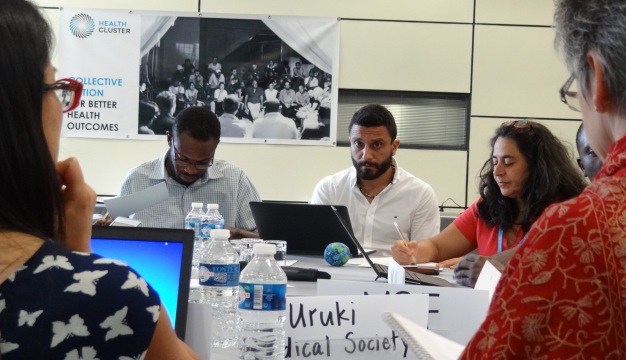
The second Joint Health Cluster Coordination Training for Health Cluster Coordinators and Information Management Officers took place in Divonne-les-Bains, France, on 16-22 July 2017. The training was organized by the Global Health Cluster and funded by the United States Agency for International Development’s Office of Foreign Disaster Assistance (USAID/OFDA).
The training was structured around the various stages of the IASC Humanitarian Programme Cycle, and was intended to strengthen the existing skills and knowledge of Health Cluster Coordinators and Information Management Officers. Both roles require finely honed skills in coordination, preparedness, implementation and monitoring, and these are instructed by evidence-based models of emergency response.
Over seven days, participants were involved in a wide variety of informative, practical, and simulation-based exercises. The latter days of the training were devoted to simulation experience, modeling the first several weeks of an emergency response, in which participants worked in two groups to apply the skills and models learned in the previous days’ workshops. Through simulated interactions with a variety of partners and stakeholders, participants developed their skills in resilient leadership and coordination. Several participants fed-back to the training team that the range of experiences within the group provided a productive environment for exchange.
The training was attended by 18 participants, who represented EMRO, AFRO, EURO and PAHO regions. There were a mix of 10 current national and sub-national Health Cluster Coordinators and eight Information Management Officers. All participant worked directly with Health Clusters. 16 participants were hired by WHO, one participant was from iMMAP, who support the Health Cluster through standby partnership arrangements, and one participant was contracted by Save the Children.
Effective coordination needs empowered leadership and robust evidence to support decisions. WHO, the Cluster Lead Agency, is continuing to invest in empowering leadership within individual national Health Clusters, and supporting high degrees of effectiveness and efficiency.
Related Documents:
Participants' views of the training
